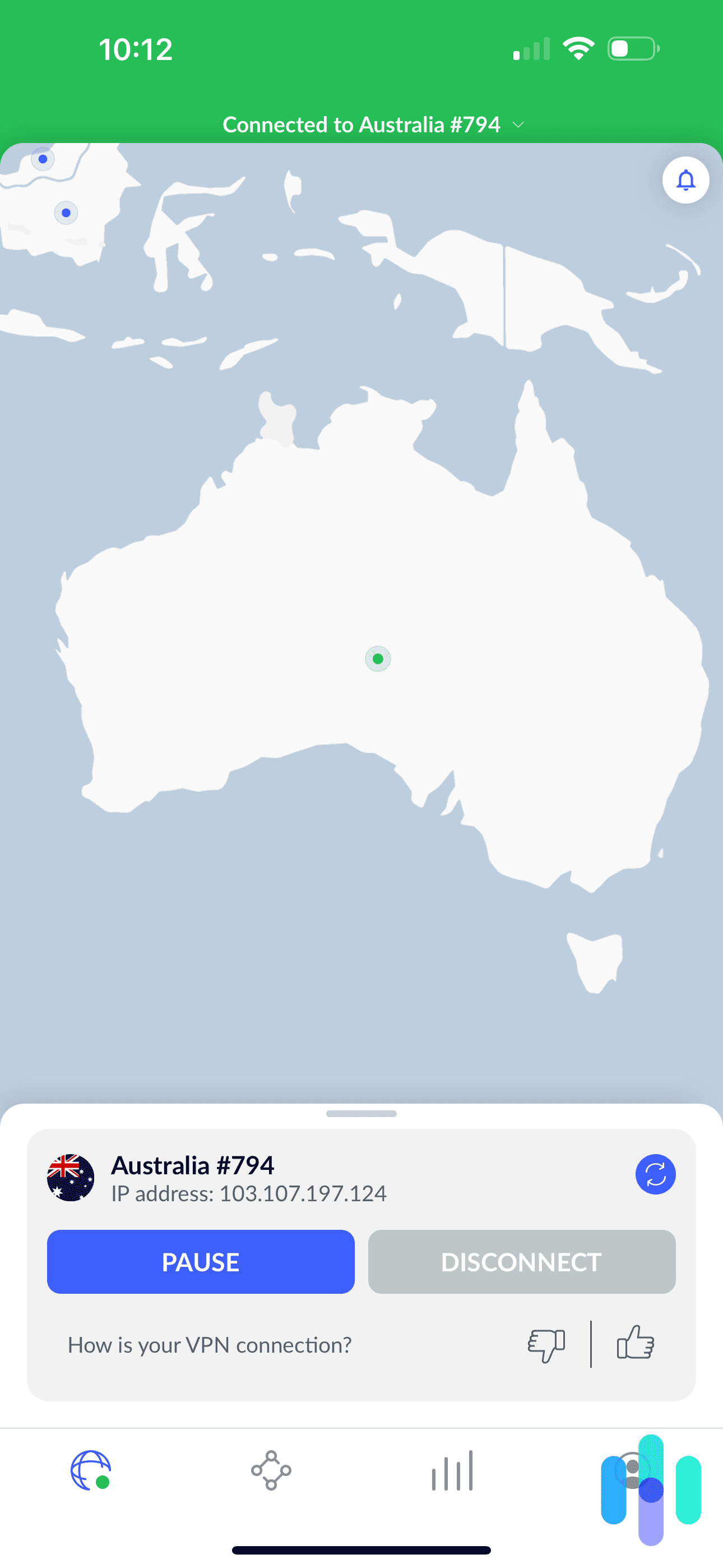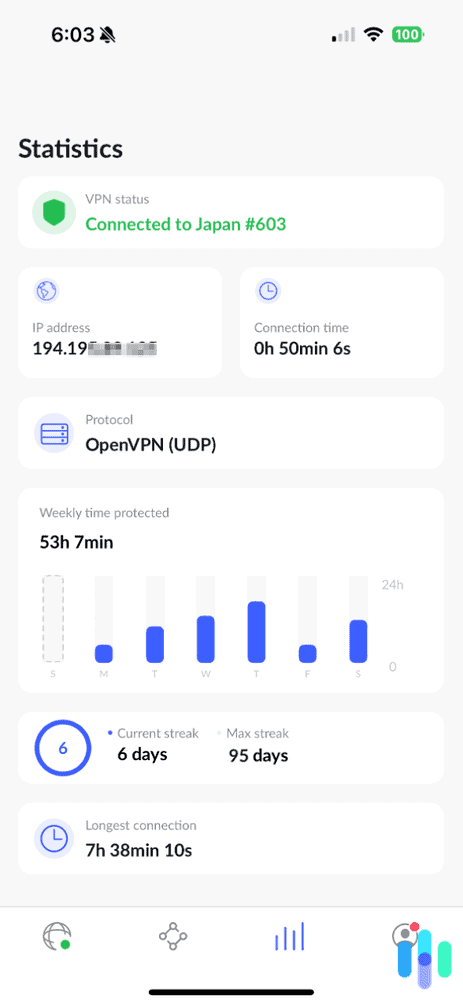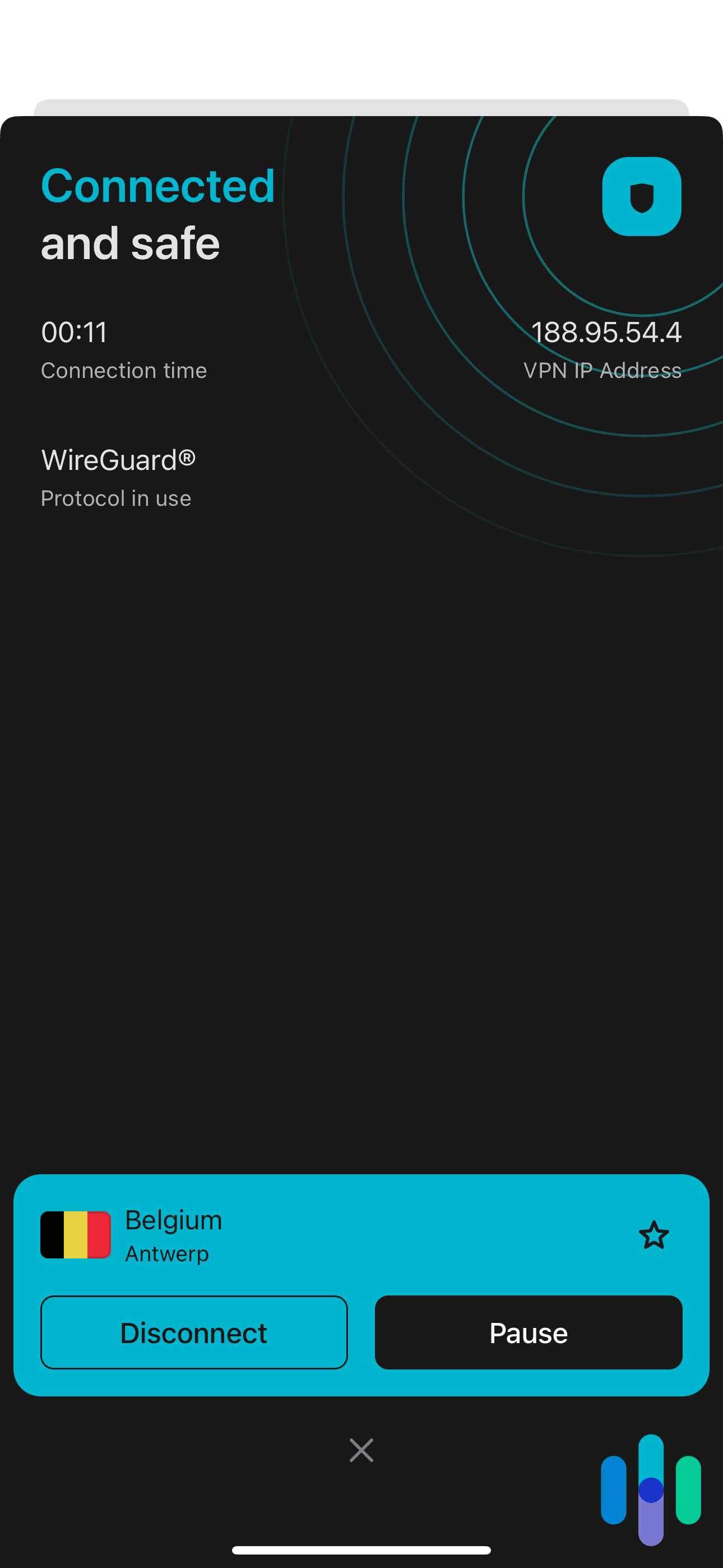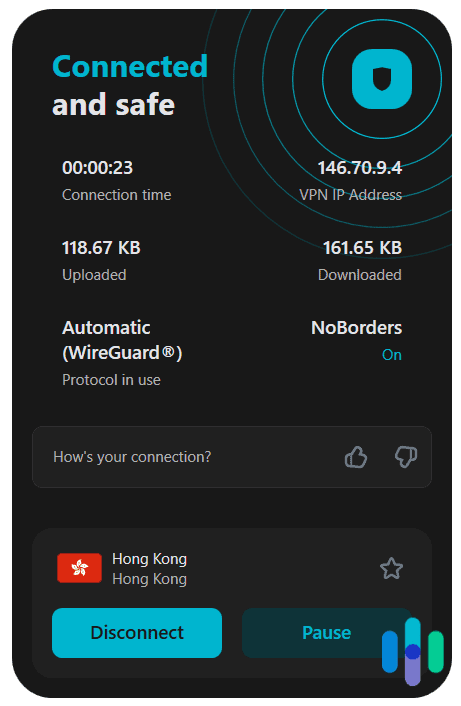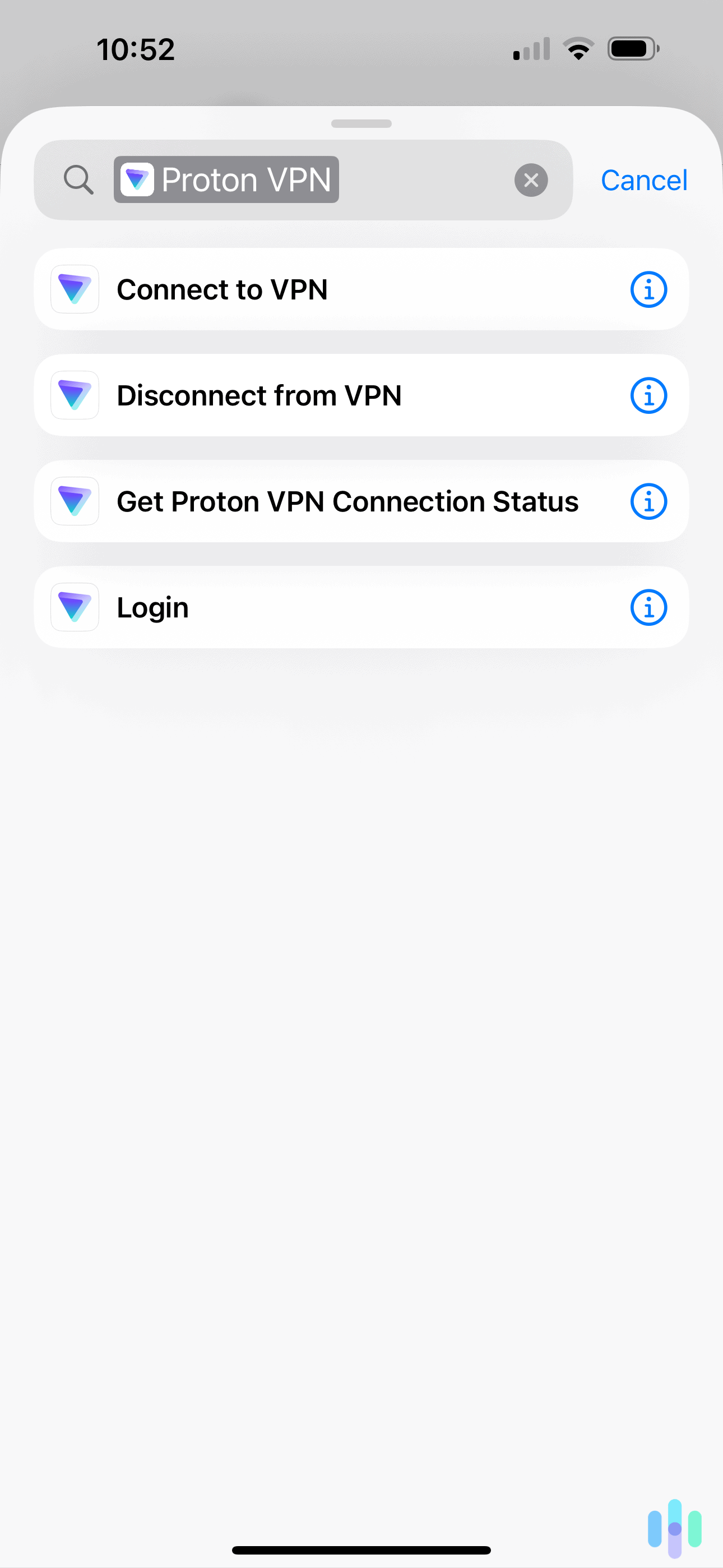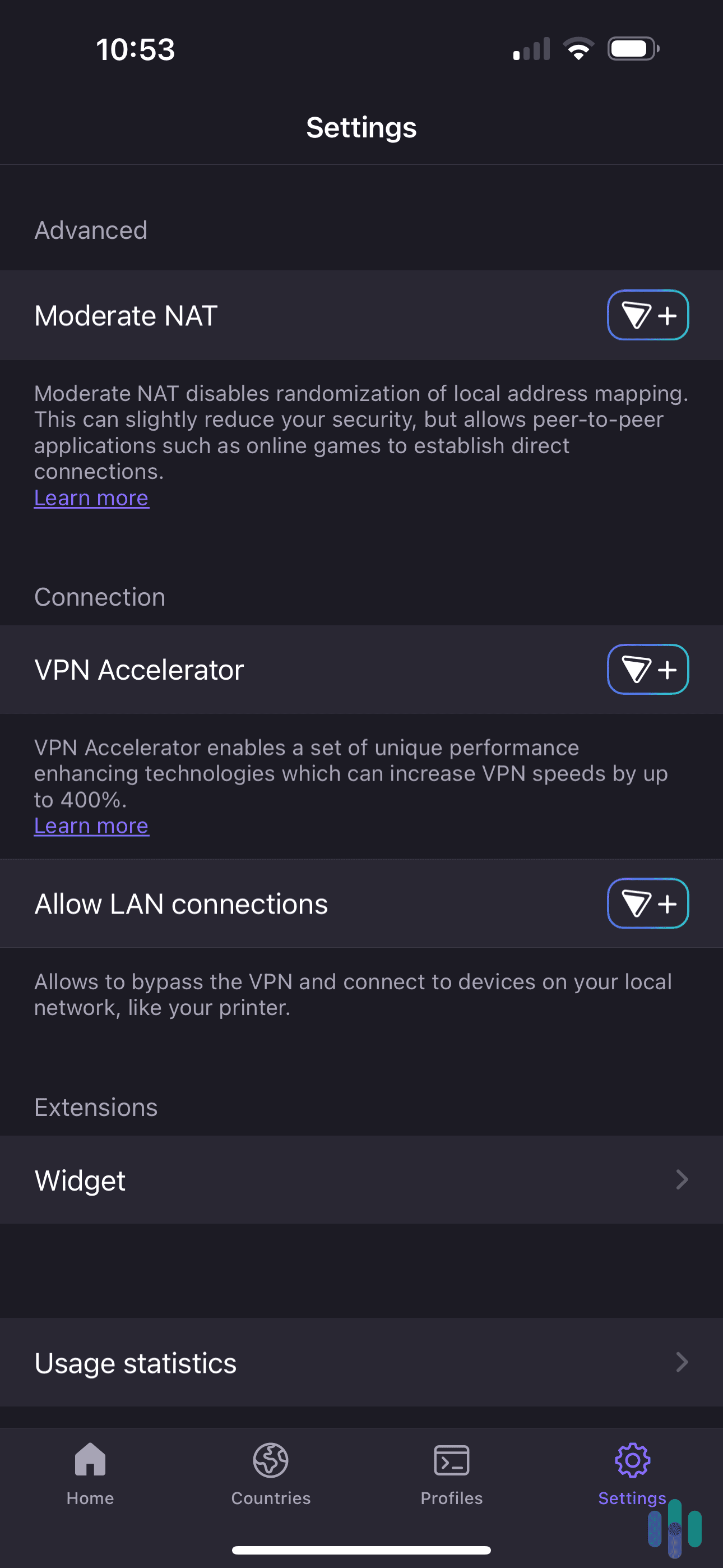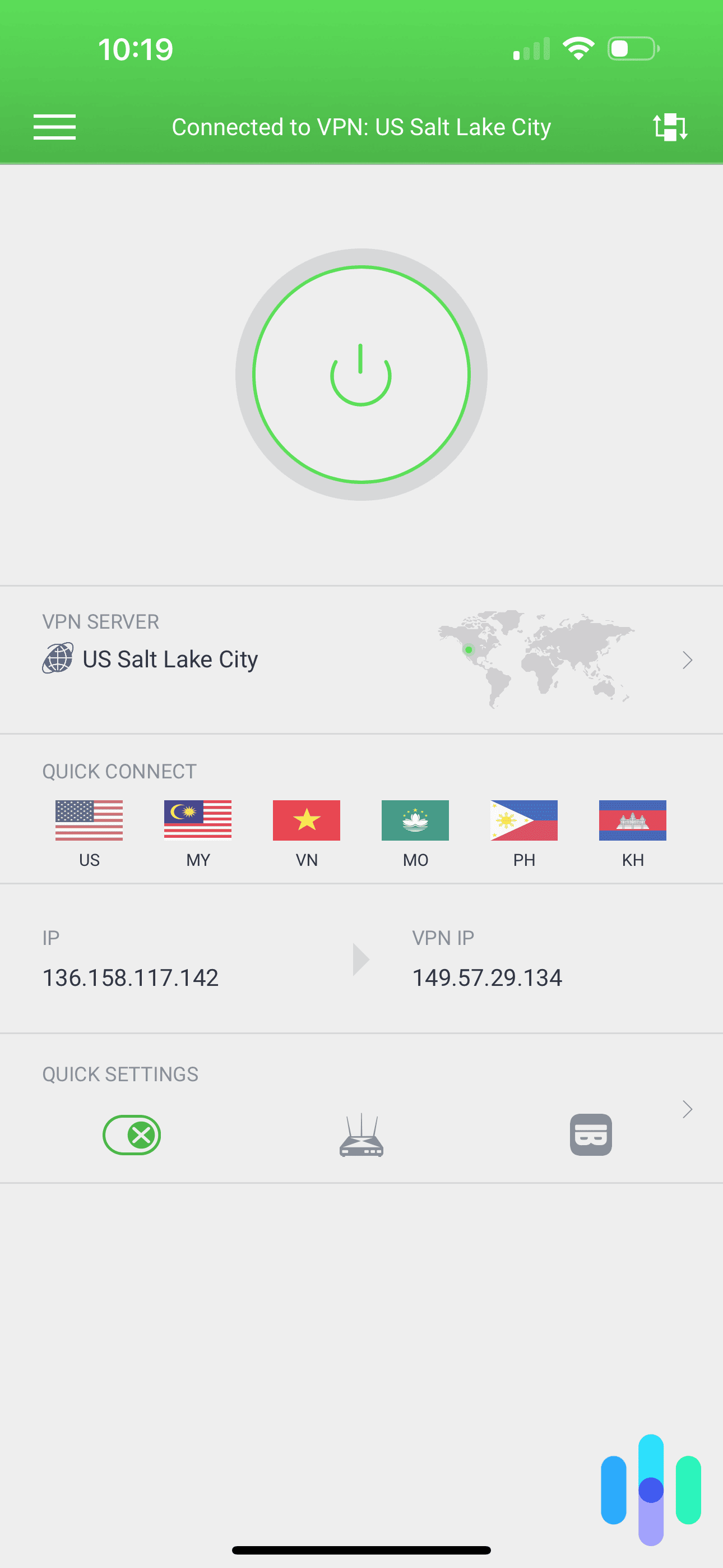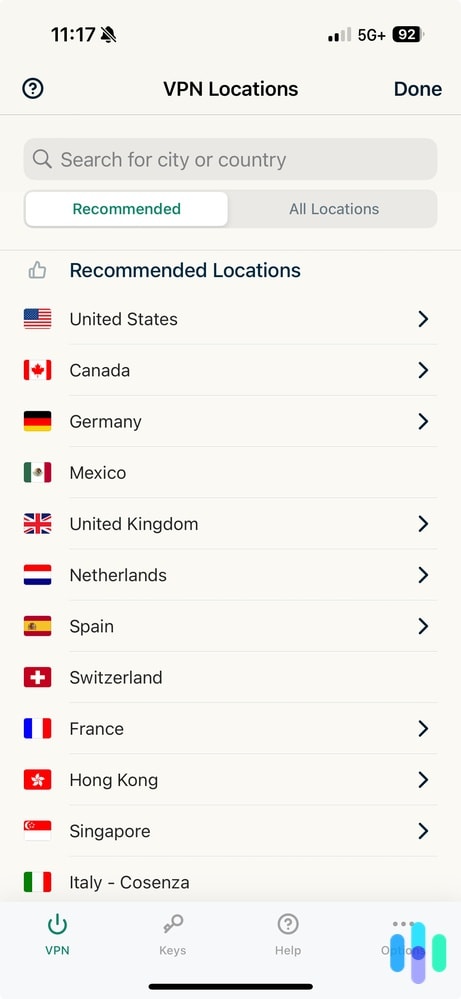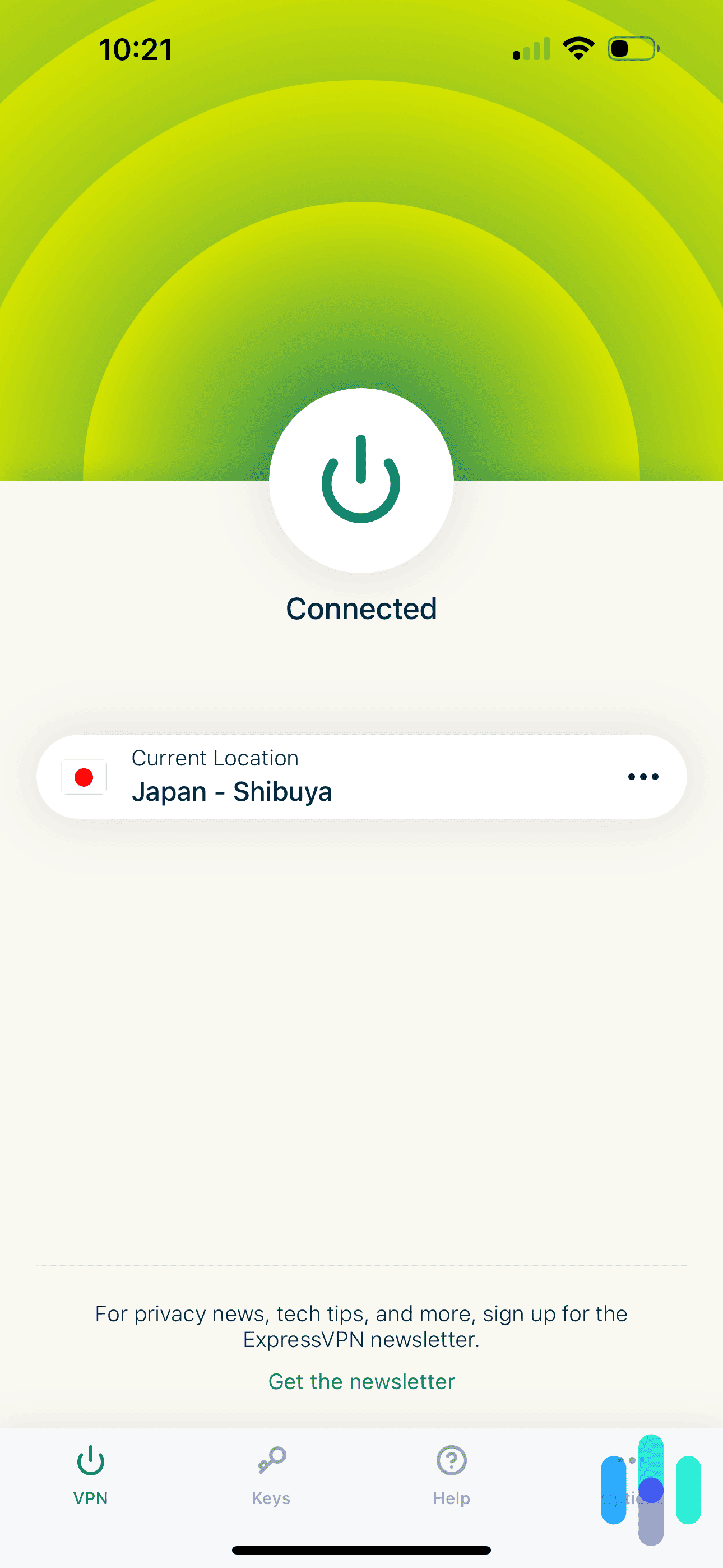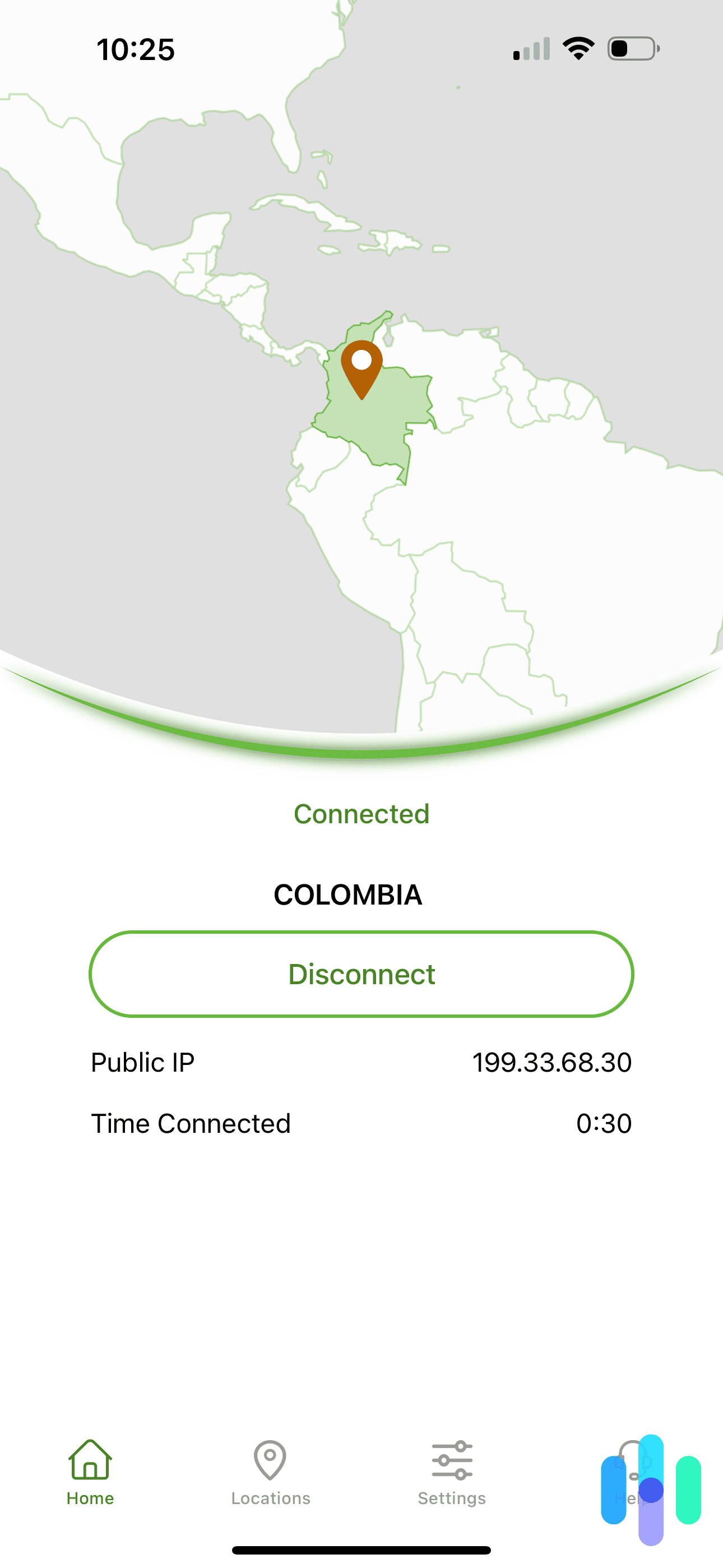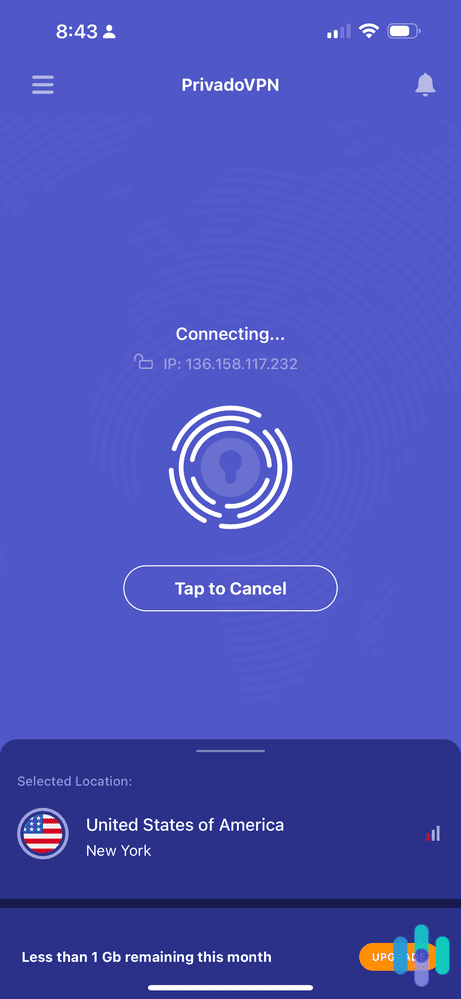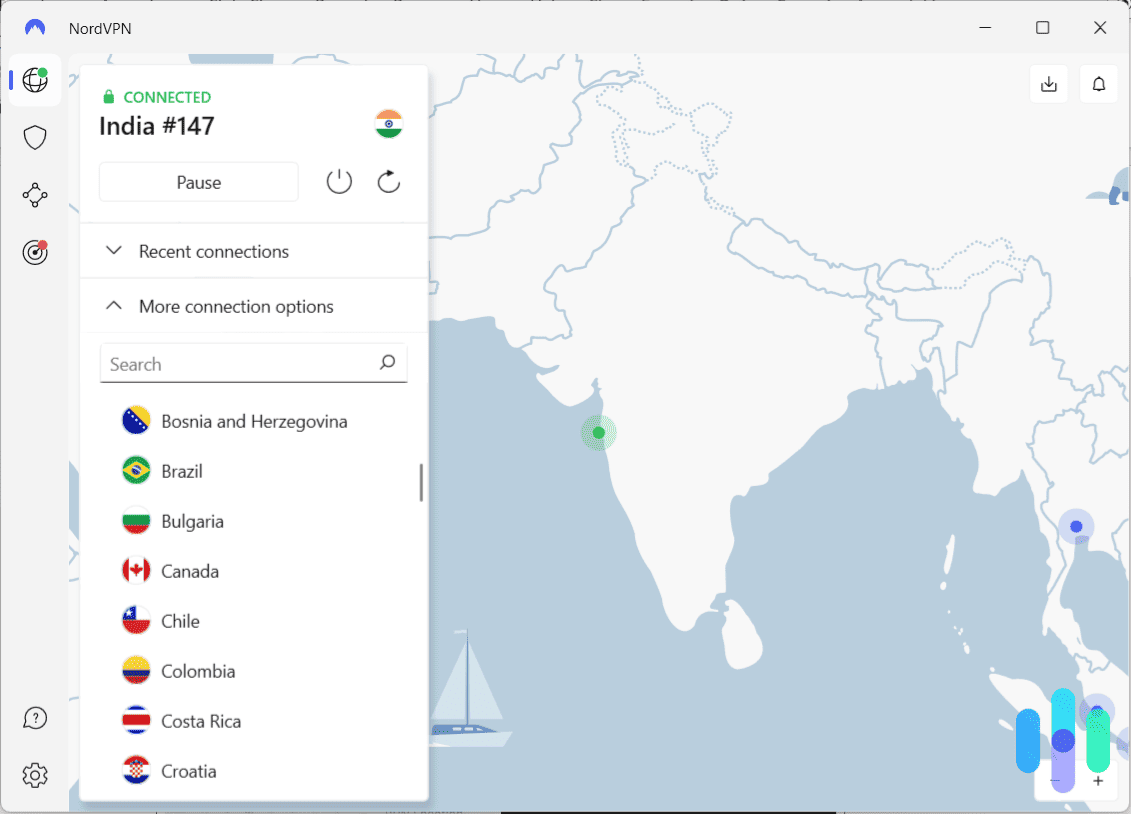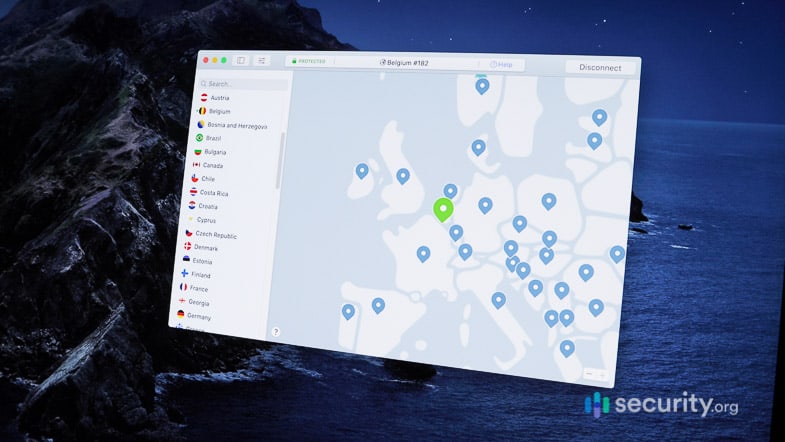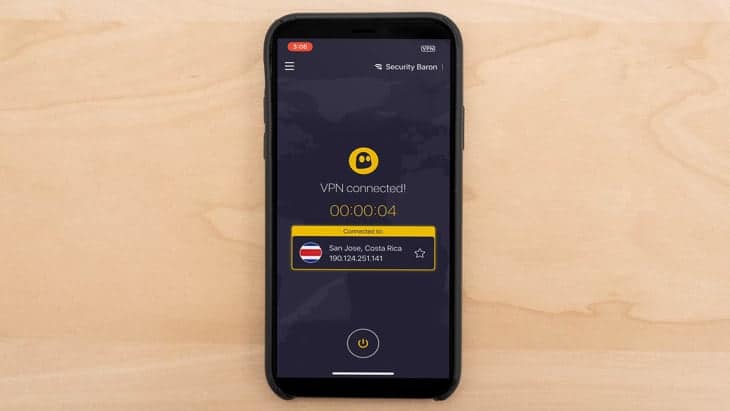The Best VPN for iPhone in 2025
With fast speeds, solid encryption, and low monthly costs, we recommend using NordVPN on your Apple devices.
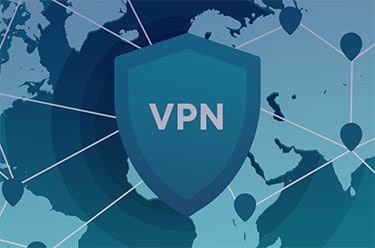

- Fast speeds on iPhones
- Consistently got through VPN blocks on streaming apps
- Easily transfer iPhone photos to other devices with Meshnet
- Fast speeds on iPhones
- Consistently got through VPN blocks on streaming apps
- Easily transfer iPhone photos to other devices with Meshnet

- One of the first to offer split tunneling on iOS
- iPhone app comes with CleanWeb malware blocker
- Streamlined iOS app
- One of the first to offer split tunneling on iOS
- iPhone app comes with CleanWeb malware blocker
- Streamlined iOS app
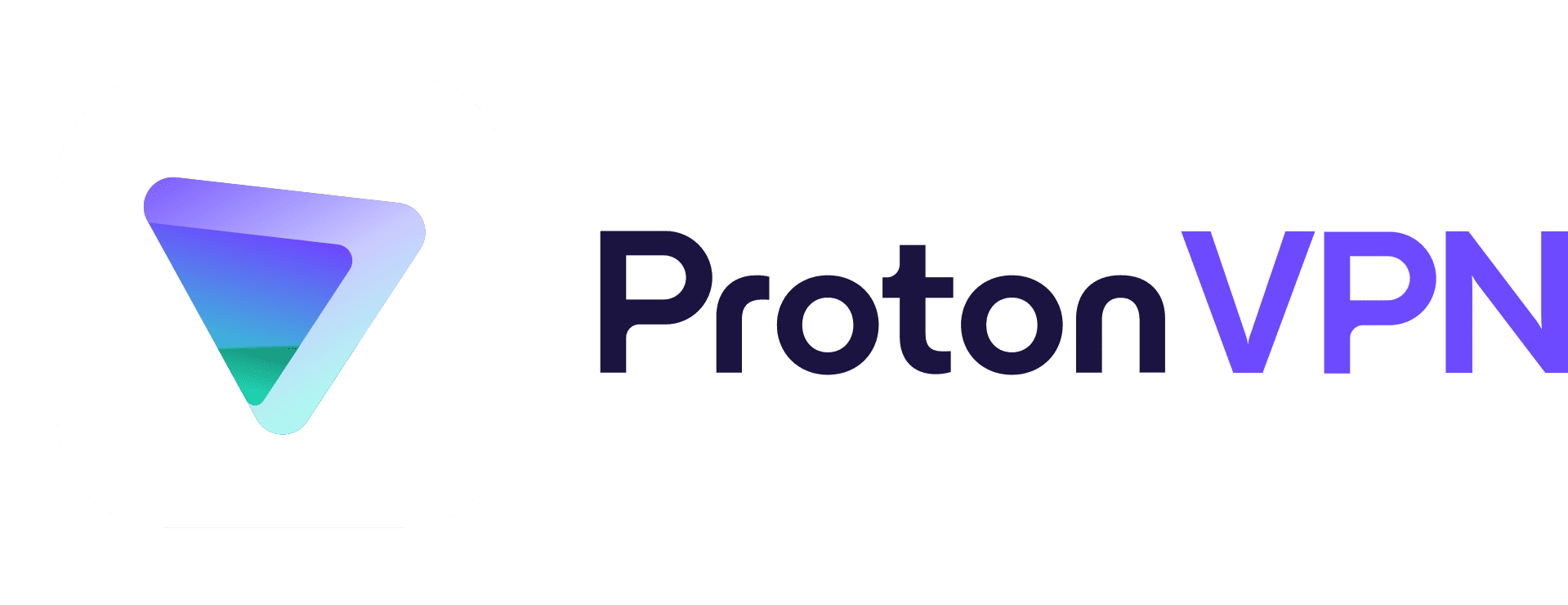
- Free version allows unlimited bandwidth, and provides strong privacy
- Maintains very fast download and upload speeds
- Has an intuitive iOS app that supports Siri integrations
- Free version allows unlimited bandwidth, and provides strong privacy
- Maintains very fast download and upload speeds
- Has an intuitive iOS app that supports Siri integrations
We always connect through a VPN when on our iPhones. It’s not just a safety thing, either. We also like the entertainment benefits such as gaining access to more content from our streaming apps. Using a VPN even helped us access TikTok when it got restricted temporarily in the U.S.
The problem is, it’s not so easy to choose a good VPN for iPhones. There are plenty of VPN apps in the App Store, but not all of them are fast, have the necessary features, and are easy to use. To help you out, we signed up for and tested over 50 iPhone VPNs to assess their speed, streaming support, security, and the user experience. NordVPN, Surfshark, Proton VPN, Private Internet Access, ExpressVPN, and IPVanish ended on top. Let’s dig into why those six are our top recommendations.
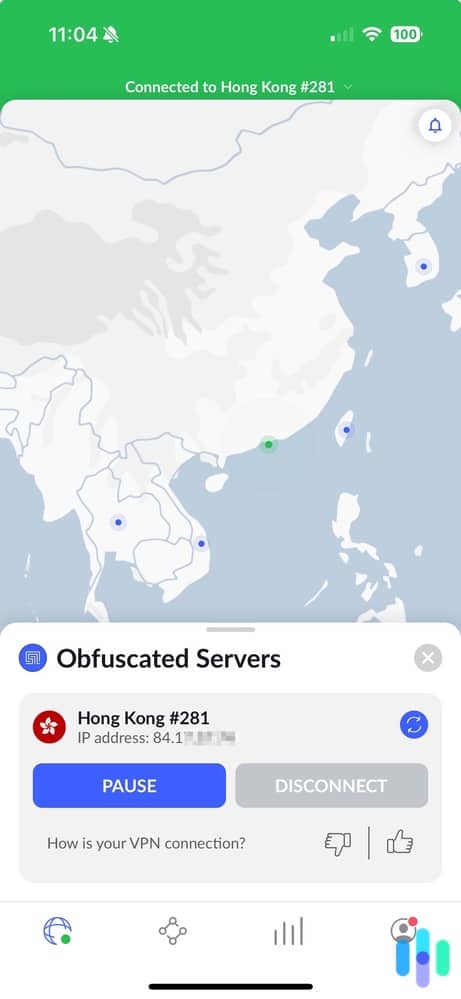

The Best VPNs for iPhone in 2025
- NordVPN - Best for Streaming
- Surfshark - Best for Privacy
- Proton VPN - Best Free VPN for iPhone
- Private Internet Access - Most User-Friendly iOS VPN
- ExpressVPN - Great for Securing Logins
- IPVanish - Great for Fast Speeds
Comparing the Top VPNs for iPhone
| System |
NordVPN

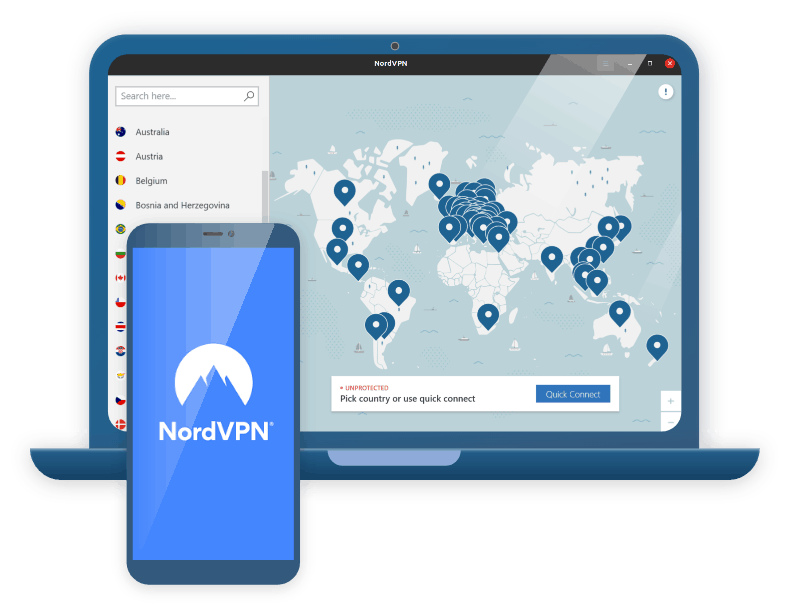
|
Surfshark


|
Proton VPN

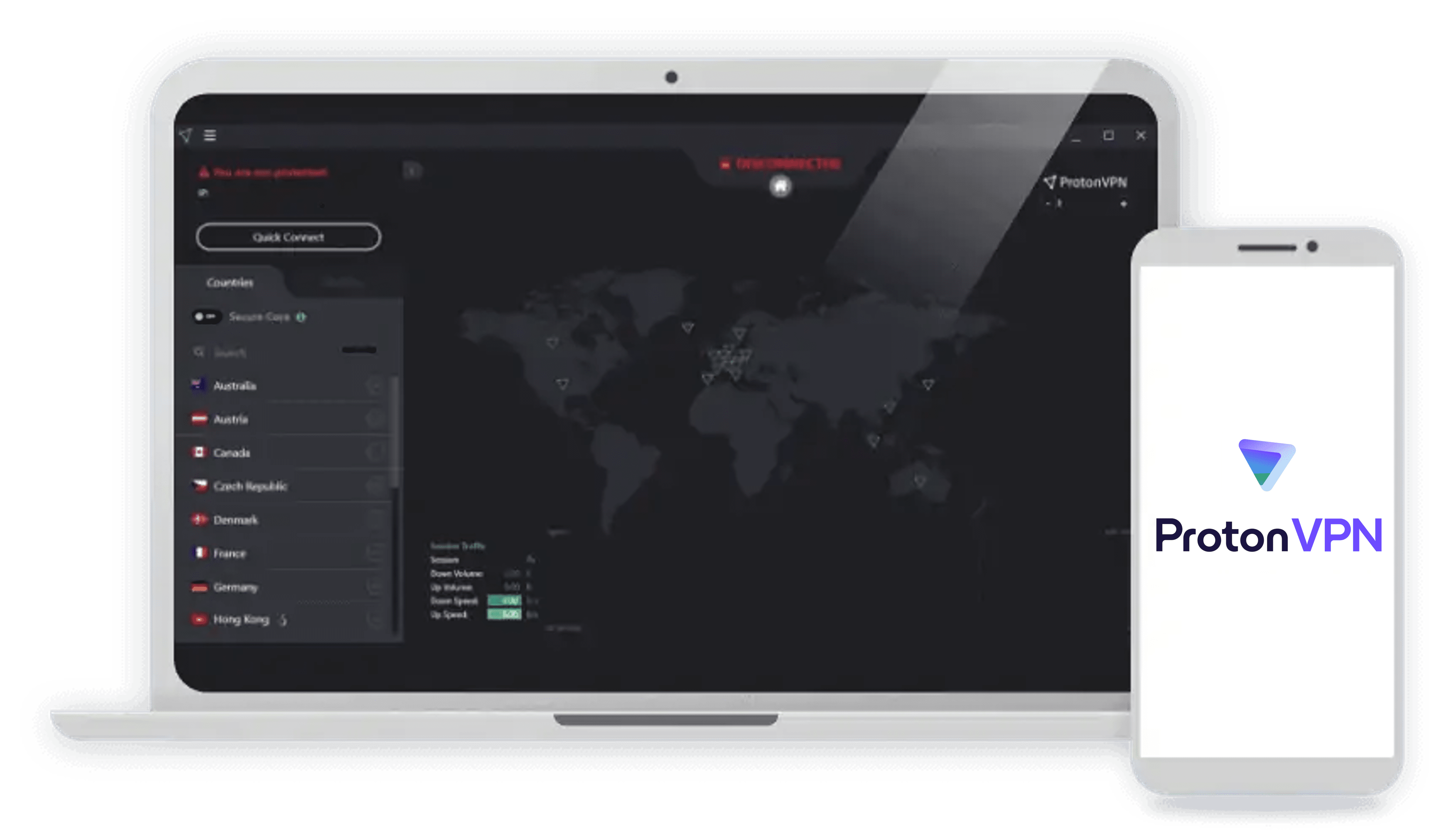
|
Private Internet Access

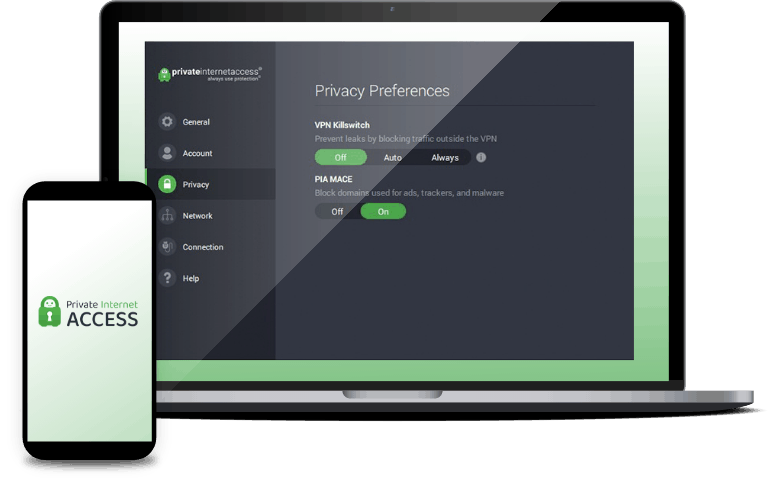
|
ExpressVPN

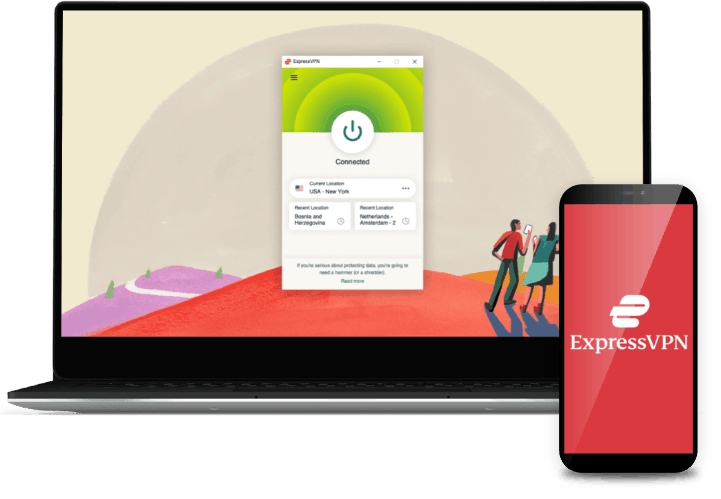
|
IPVanish


|
|---|---|---|---|---|---|---|
| Ranking | 1st | 2nd | 3rd | 4th | 5th | 6th |
| Ratings | 9.7/10 | 9.5/10 | 9.3/10 | 9.4/10 | 9.1/10 | 9.3/10 |
| Minimum Monthly Cost | $3.09 | $2.19 | $4.49 | $1.98 | $4.99 | $2.19 |
| No. of Devices | Up to 10 | Unlimited | Up to 10 | Unlimited | Up to 5 | Unlimited |
| iPhone App VPN Protocols | OpenVPN, NordLynx (proprietary), IKEv2/IPSec | OpenVPN, WireGuard, IKEv2/IPSec | WireGuard, Stealth | OpenVPN, WireGuard, IKEv2/IPSec | Lightway, IKEv2/IPSec | OpenVPN, WireGuard, IKEv2/IPSec |
| Server Locations | 118 Countries | 100 Countries | 117 countries | 91 Countries | 105 Countries | 108 Countries |
| iOS Split Tunneling | No | Yes | No | No | No | Yes |
| Read Review | NordVPN Review | Surfshark Review | Proton VPN Review | Private Internet Access Review | ExpressVPN Review | IPVanish Review |
Setting Up a VPN on iOS
Setting up a VPN on an iPhone is often just a three step process:
- Buy a subscription for a VPN service.
- Download and install the app from the App Store.
- Login and start using.
As you connect for the first time, the VPN app might ask permission to “create a new VPN profile.” Be sure to agree, as this is a necessary step that allows your iPhone to connect through the VPN.
» More Info: Change the Location on an iPhone
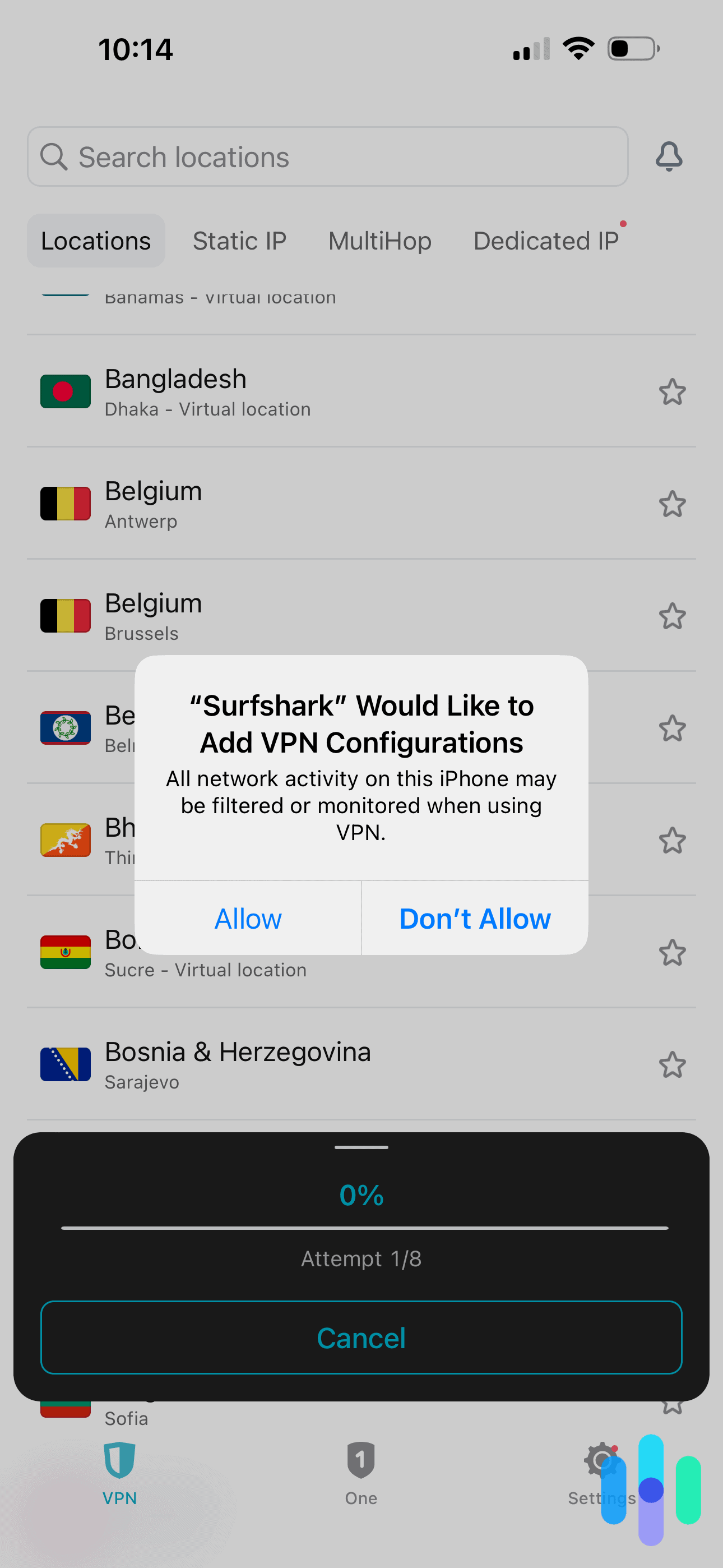
You can also set up a VPN manually in your iPhone’s Settings app. This requires a deeper understanding of how VPNs work, so if an app is available, we always recommend using it to set up a VPN. If you’re interested in learning how to manually set up a VPN, though, check our iPhone VPN setup guide.
>> Related Reading: Best VPNs for iPads
What are the Best iPhone VPNs?
-
1. NordVPN - Best for Streaming
 View Plans Links to NordVPN
View Plans Links to NordVPNProduct Specs
Multihop Yes Obfuscated Servers Yes Kill Switch Yes Split Tunneling Yes Netflix Yes Torrenting Yes 
Who NordVPN is Good For
NordVPN is the ideal choice for streaming. They offer a proprietary VPN protocol called NordLynx which kept our internet speeds fast enough to stream 4K content. But that’s not all. They also made a feature called StreamPlay that makes it easier to bypass VPN blocks on streaming sites.
Of course, there’s also NordVPN’s impressive server infrastructure, with over 7,200 servers spread throughout 118 countries. That’s not the most servers and server locations in the industry, but NordVPN has a good balance of the two. For instance, when we tested HMA VPN, we found servers in over 210 countries, but the VPN itself operates only 1,100 servers in total. With more servers, NordVPN is less likely to get overloaded than HMA, making it more likely to give you a fast streaming experience. We never experienced buffering with NordVPN.
What We Like
- Industry standard 256-bit AES encryption
- Strong VPN protocol options for iOS users
- Strict logging policy
- Option for multi-hop (Double VPN)
What We Don’t Like
- Occasional failure to establish connections
- No split tunneling
- Pricier than other options
- No free trial
Did You Know: NordVPN isn’t the only VPN with a proprietary protocol that impressed us. When we tested UltraVPN and ExpressVPN, they both offered lightweight proprietary protocols that kept our internet fast.
iOS App User Experience
We think NordVPN’s iPhone app is well-designed. Connecting is easy (just one tap!). There might be a slight learning curve for folks new to VPNs, but that’s only because of the sheer number of features. NordVPN even offers Siri integration, which we rarely see with VPN apps. After telling Siri to connect us to NordVPN, we ran WebRTC leak tests to ensure those servers were private.
As for the app’s performance, we are satisfied overall. There were times it failed to connect, but just closing the app and reopening it got it working again. It isn’t a perfect app, but it’s as close to perfect as we’ve seen from iPhone VPN apps.
However, we could only connect 10 devices (iPhones or otherwise) to NordVPN at once. That at least beats the industry average of five to eight simultaneous connections, but we prefer the unlimited connections Surfshark offers.
We used NordVPN to connect through Australia giving us access to Australia’s Netflix library. Server Network & Streaming
All NordVPN servers have a feature called SmartPlay, which is designed to give more reliable access to streamed content. It also combines several VPN technologies to keep streaming fast as well as secure. In fact, when we visited friends in Canada recently, we were able to access Hulu with the help of NordVPN, despite Hulu being one of the U.S.-only streaming apps with strong VPN detection. Check out our list of the best VPNs for Hulu — NordVPN is #1.
It’s not just for Hulu, of course. NordVPN works with a number of streaming apps, and because it has servers in 118 countries, it can unblock geo-restricted content from pretty much any region in the world — not just the U.S. We connected to a U.K. server to get a U.K. IP address, and after figuring out how to change our iPhone’s App Store location to download the BBC iPlayer app, we were able to access the app. That’s the advantage of having servers everywhere.
>> Read About: How to Check if a VPN Is Working
Extra Features
NordVPN clearly showed our usage so we could figure out whether or not our subscription was worth the price. NordVPN is filled with features. Sometimes, it can feel overwhelming — that is, until you get a handle on them and realize how useful each feature is, particularly the Meshnet virtual local area network (vLAN).
You know how handy Airdrop is — it lets you easily move files from your phone to your MacBook and vice versa. Well, that’s essentially what Meshnet does, except it uses NordVPN’s server network to deliver files from one device to another anywhere in the world. You can send files to your own devices (even those not made by Apple) or even add other people’s devices to your Meshnet vLAN. It’s not just for convenience either — it’s also secure because NordVPN’s servers are well-encrypted. In fact, we regularly use Meshnet to exchange files with our colleagues working remotely.
Pricing
We definitely got the most value out of NordVPN by subscribing for a long-term plan. The two-year plan with full access to their VPN averages out to $3.09 per month. But we ended up going with the Complete plan since we needed cloud storage. The malware protection and password manager were nice bonuses, too. That two-year plan averages out to $4.99 per month. That’s over a hundred dollars we paid upfront, but we appreciate that NordVPN has a 30-day money-back guarantee on all purchases. Here’s a quick look at NordVPN’s plans:
Plan length Basic Plus Complete Prime One month $12.99 per month $13.99 per month $14.99 per month $17.99 per month One year $4.99 per month $5.99 per month $6.99 per month $8.99 per month Two years $3.09 per month $3.99 per month $4.99 per month $6.99 per month -
2. Surfshark - Best for Privacy
 View Plans Links to Surfshark
View Plans Links to SurfsharkProduct Specs
Multi-hop Yes Camouflage Mode Yes Kill switch Yes Split Tunneling Yes Netflix Yes Torrenting Yes 
Who Surfshark is Good For
There’s a reason Surfshark is one of our favorite no-logs VPNs — they barely collect any data. They even let us pay with cryptocurrency so that they didn’t have to store our billing information. Although their data policy allows them to store your iPhone’s IP address when you connect to a server, they assert that they encrypt that data and then delete it within 15 minutes of you disconnecting. We trust this claim because it’s been third-party audited, and they use RAM-based servers, which can’t store data after a restart.
>> Read More: How to Find the IP Address on Your iPhone
What We Like
- RAM-only servers for extra privacy
- Native widget support on iOS
- Strict logging policy proven with third-party audits
- Up to 10 Gbps servers
What We Don’t Like
- Slower when connected to overseas servers
- Lacks customer support over the phone (email and live chat only)
- Price increases after the initial two-year subscription
- Expensive month-to-month plans starting at $15.45
iOS App User Experience
Surfshark’s iOS app was intuitive and easy for us to use. We gave Surfshark major points for its usability. It’s one of the handful of iPhone VPN apps that has native widget support. There’s no need to pull up the app — just connect from the home screen. We personally prefer NordVPN’s Siri support, but those native widgets are a close second.
Surfshark also offers a lot of features that we use regularly. Camouflage Mode uses obfuscated servers to hide your use of a VPN. Dynamic MultiHop gives extra protection by routing traffic through two VPN servers of your choosing.
Pro Tip: To minimize your speed loss when using Surfshark’s Dynamic MultiHop, choose a server close to you as your first server and the location you want your IP address changed to as your second server. Letting you choose your server pairing when using a double VPN is better than offering pre-determined server pairs like NordVPN does, which we highlighted when we compared NordVPN and Surfshark.
Server Network & Streaming
Surfshark doesn’t have as many servers as NordVPN, but we found it had enough for us to get around any geo-restrictions for streaming on Netflix and Hulu. We tested Surfshark’s streaming capabilities by connecting through a Canadian server to access “The Office” on Netflix. Since Canada isn’t too far away, we didn’t experience any buffering either. And hey, servers in 18 fewer countries is a fair trade off considering Surfshark supports unlimited devices instead of 10 simultaneous connections with NordVPN.
What makes Surfshark easy to use with streaming apps is their native widget support. Everytime we want to watch Netflix, we just connect via the widget to the Canadian server we added to our favorites, then go straight to the Netflix app. It might seem small, but little conveniences like that make a big difference, especially since we used it daily. This all put Surfshark on our list of the best VPNs for Netflix.
FYI: Streaming apps try to block people from using VPNs since their licensing is only good for specific countries. That’s why some shows and movies are locked based on your geographic area. We had to try a few different servers until we found one that worked with Hulu.
Extra Features
Surfshark automatically turned on NoBorders mode to get around our work network’s VPN restriction. iOS used to not allow split tunneling for any VPN app, but that changed this past year. Now, VPN apps can have split tunneling on iPhones. Building and developing those features takes time, but that’s not stopping Surfshark. They already rolled out split tunneling to their iPhone app which we used during our last test. Split tunneling lets you decide which apps or websites get routed through the VPN and which ones go directly through your network. We set our Clash of Clans app to not route through Surfshark to minimize lag.
Pricing
At first glance, Surfshark’s pricing looks high. Their month-to-month plans start at $15.45 and go up to $20.65. That’s a lot more than we want to spend on a VPN. However, Surfshark offers huge discounts for long-term subscriptions, with prices as low as $2.19 per month. We wanted to test Surfshark’s antivirus too, so we went with Surfshark One. Here’s an overview of Surfshark’s prices so you can figure out what fits your budget:
Plan Length Starter One One+ One month $15.45 $17.95 $20.65 One year $3.19 $3.39 $6.09 Two years $2.19 $2.69 $4.29 Pro Tip: Surfshark’s deals are surprisingly good for the VPN industry. We’re used to seeing providers offer the same discounts year-round, but Surfshark actually discounts their pricing for sales holidays. Most recently, they reduced the price of their two-year plans to as low as $1.99 per month for their birthday event.
Expert TakeFrom Subbu Sthanu, Chief Commercial Officer of IPVanish“A friend’s colleague once connected to what he thought was a secure Wi-Fi hotspot at Holborn tube station in London, assuming it was part of the official TFL network. Unfortunately, it turned out to be a hacker’s spoofed Wi-Fi. Soon after, his iPhone was locked, and he noticed suspicious activity on his online accounts. He already knew about the dangers of using unsecured public Wi-Fi but thought he’d be able to determine if it was a fake network himself; VPN encryption would’ve directly prevented this.” -
3. Proton VPN - Best Free VPN for iPhone
View Plans Links to Proton VPNProduct Specs
Multi-hop Yes Camouflage Mode Yes Kill switch Yes Split Tunneling Yes Netflix Yes Torrenting Yes Who Proton VPN is Good For
Proton VPN is the best free VPN for iPhone users because it allows unlimited bandwidth — most free VPNs limit users to anywhere between 2 GB and 10 GB per month. Proton VPN’s free plan also delivers fast speeds, and provides strong security and privacy.
>> Related Reading: The Best Free VPNs in 2025
What We Like
- Free version offers unlimited data, strong privacy, and fast speeds
- Has a very intuitive iOS app that supports Siri integrations
- Paid version works with over 90 streaming services
What We Don’t Like
- Free plan limits you to five countries, and doesn’t let you pick the server
- All paid plans come with a 30-day refund, but it’s prorated
iOS App User Experience
Proton VPN s iPhone app allows free users to set up Siri integrations. Proton VPN’s iPhone app is easy to install and user-friendly. The free version auto-picks the fastest server for you, securing your traffic right away. That said, we wished the VPN would give free users the option to also manually connect to servers.
The app also supports Siri commands, just like NordVPN. You can use voice commands to auto-connect to the fastest server, disconnect from the VPN, or check your connection status.
Expert Insight: Paid users get “Profiles,” a tool that automates VPN connections. For example, you can set up a Netflix US profile that auto-connects you to the fastest US server.
Server Network & Streaming
Proton VPN’s free plan restricts you to five countries: the US, the Netherlands, Japan, Poland, and Romania. There’s also no streaming support — we tried accessing Netflix, Disney+, and Max via free servers, and we weren’t able to.
However, paid users get access to over 13,000+ servers in 117 countries and excellent streaming support, as Proton VPN works with over 90 streaming services.
Extra Features
Proton VPN’s paid plans add useful extra features, like VPN Accelerator, which boosts speeds. Proton VPN’s free plan doesn’t provide access to additional features. If you upgrade, you unlock “NetShield,” a tool that blocks ads, trackers, and malicious websites. In our tests, it got rid of over 90 percent of ads.
The paid version also adds “VPN Accelerator” and “Secure Core” servers. “VPN Accelerator” improves performance across all VPN servers. And “Secure Core” routes your data through an additional server that’s located in a privacy-friendly country, like Switzerland or Iceland.
Test Results: When we enabled “VPN Accelerator,” it increased our VPN speeds by up to 50 percent, which is very impressive.
Pricing
Proton VPN offers two paid tiers: “VPN Plus” and “Proton Unlimited.” “VPN Plus” is best for most iPhone users since it includes all core VPN features. “Proton Unlimited” is only worth it if you want additional privacy tools, like Proton Pass or ProtonMail.
“VPN Plus” “Proton Unlimited” 1-Month $9.99/month $12.99/month 1-Year $4.99/month $9.99/month 2-Years $4.49/month $7.99/month All Proton VPN plans include a 30-day money-back guarantee, but it’s prorated. This means you’ll only be refunded for the unused portion of your subscription.
-
4. Private Internet Access - Most User-Friendly iOS VPN
 View Plans Links to Private Internet Access
View Plans Links to Private Internet AccessProduct Specs
Multihop Yes Obfuscated Servers Yes Kill Switch Yes Split Tunneling Yes Netflix Yes Torrenting Yes 
Who Private Internet Access is Good For
Sometimes, we don’t want to get bogged down with features and want a VPN we can just pull up, hit connect, and start streaming geo-locked content. If that’s you on a regular basis, Private Internet Access should be at the top of your list. They don’t have cutting edge features like NordVPN’s Meshnet or Surfshark’s split tunneling on iOS. Instead, their app offers features centered around making your VPN easier to use.
What We Like
- 24/7 live chat support
- Affordable subscriptions
- Seven-day free trial on iOS
- Easy-to-use app
What We Don’t Like
- No split tunneling on iOS
- Best prices require a three-year subscription
- iOS app has had persistent connection issues in the past
- Based in the United States
iOS App User Experience
We named Private Internet Access as the most user-friendly VPN for iPhones, but it’s more than just easy to use. It offers features that keep our iPhone safer. For instance, they have automation settings. We used this to have the VPN connect automatically whenever it detects that we’re connected to a public Wi-Fi network. This makes sure our data is never exposed due to a spoofed public Wi-Fi.
Just like NordVPN, Private Internet Access supports Siri too. That’s not the only similarity we found when comparing NordVPN and Private Internet Access. Each of them let us set a personal phrase for connecting and disconnecting, too. We set ours to “encrypt our connection” so it didn’t sound like any of our other Siri phrases. Setting our own phrase made it easier to remember.
FYI: Private Internet Access isn’t the only VPN that lets you automatically connect on an iPhone. But, it’s one of the few to offer rules like only automatically connecting when using a public Wi-Fi network. For instance, when we compared Surfshark and Private Internet Access, Surfshark only let us choose a server to automatically connect through.
Server Network & Streaming
Private Internet Access automatically connected us to the nearest server to maximize our speeds. Private Internet Access has the most servers of all the VPNs we’ve tested. They boast over 35,000 servers. Comparing Surfshark to Private Internet Access, that’s about 10 times more servers. And while they don’t have servers in as many countries as either NordVPN or Surfshark, we appreciate that Private Internet Access has servers in all 50 U.S. states. That means there’ll be a server near you, even if you live in rural Wisconsin.
Private Internet Access’ wide server reach also means you can always find one that can get through on streaming apps. Like we mentioned, streaming services try to block VPNs. They do this by blocking the IP addresses of VPN servers. And with 35,000 servers, that’s a lot of IP addresses the streaming service of your choice would need to block. They also offer streaming-optimized servers, which give a higher likelihood of getting through.
Pro Tip: It usually takes us three to five tries until we find a server that’s not blocked by our streaming services. So, if the first one doesn’t work, try connecting through a different location to get a different IP address. You’ll find one eventually. When you find one that works, save it so you can easily connect through it next time.
Extra Features
Although it’s not a unique feature, we appreciated Private Internet Access’ ad blocker. Most VPNs offer it, but when paired with their automation that lets you connect to Private Internet Access everytime you switch to cellular data, it can save you money. Every time your phone loads an ad, it uses up your data. We don’t have an unlimited plan, so that costs us money. Automatically connecting to Private Internet Access when we switched to cellular data prevented ads from chewing up our monthly quota. And it can do the same for you, too.
Pricing
Another huge benefit of Private Internet Access is its low prices. To get the best deal, you’ll need to subscribe for three years. Their shorter plans are priced well, too, though. For instance, Private Internet Access’ one-year plan costs less per month than NordVPN’s two-year plan. Another big difference is they only have one tier of service. Here’s an overview of Private Internet Access’ prices:
Plan Length Price One month $11.95 One year $3.33 per month Three years $1.98 per month -
5. ExpressVPN - Great for Securing Logins
View Plans Links to ExpressVPNProduct Specs
Multihop No Obfuscated Servers Yes Kill Switch Yes Split Tunneling Yes Netflix Yes Torrenting Yes Who ExpressVPN is Good For
The ExpressVPN iOS app comes with ExpressVPN Keys built right into it. In case you didn’t know, ExpressVPN Keys is a password manager that comes with an ExpressVPN subscription. When we tested ExpressVPN Keys, its integration into the ExpressVPN iOS app was one of its standout features. Even our favorite password managers, which have VPN bundles like NordPass, require a separate app. That bundled app came in handy because our iPhone’s storage is almost completely full, to the point where we need to delete an app every time we install a new one.
What We Like
- Thoughtfully designed app that shows connection status, VPN IP address, etc.
- Regular updates to fix bugs and improve security features
- Strong protection against IP address leaks
- Integrated password manager
What We Don’t Like
- Higher price point than most of its competitors
- No customer service phone support
- Limit of eight simultaneous connections
- iOS 14 or older will not receive security and app updates
iOS App User Experience
ExpressVPN’s iOS Apps recommended locations One of our favorite things about ExpressVPN’s app, aside from its password manager integration, is the customizable shortcuts. Like we mentioned, we like to watch The Office on Netflix, but it’s not available in the U.S., so we use a VPN to connect through Canada, where it is available. ExpressVPN’s shortcuts feature makes this easy. We set a shortcut to the Netflix app, so we can hit connect, press the shortcut, and it brings us right into our Netflix account, connected through Canada, so we can start watching The Office.
>> Learn More: How to Watch Netflix With a VPN
Server Network & Streaming
We could manage our passwords in the ExpressVPN app through the Keys tab. Like NordVPN, ExpressVPN also developed their own VPN protocol. They call it Lightway, and based on our experience, it works well for iPhones since it’s a lightweight protocol. That means it doesn’t take much processing power to run, so it will work well on older iPhones while using a streaming app at the same time without causing your phone to lag. Just keep your old iPhone up-to-date if you want to use ExpressVPN because they stopped rolling out security updates for iOS 14 and earlier.
Did You Know: When comparing ExpressVPN to Surfshark, we noticed they had a similar server infrastructure with over 3,000 servers spread across at least 100 countries. ExpressVPN has servers in five more countries, but they have fewer server locations in the U.S. at 18 instead of 22 with Surfshark. So, it can connect abroad a bit better, but you might experience slower speeds in the U.S. if you’re not near one of the cities they have servers in.
Extra Features
Really, the standout feature for ExpressVPN is the password manager we mentioned earlier. That, paired with their shortcuts, made streaming really easy. It let us quickly switch to our streaming app after connecting and then log in without having to input our password. Normally, when we go to our streaming app through a VPN, we get automatically logged out since they think we’re in a different location and using a new device. The built-in password manager shortcuts this process.
Pricing
This is where our problem with ExpressVPN starts. It’s a solid VPN all around, with some unique features that make using it convenient, but it’s more expensive than most other VPNs, even with a long-term subscription. Here’s how much ExpressVPN costs:
Plan Length Cost One month $12.95 One year $6.67 per month Two years $4.99 per month -
6. IPVanish - Great for Fast Speeds
View Plans Links to IPVanishProduct Specs
Multihop Yes Obfuscated Servers Yes Kill Switch Yes Split Tunneling Yes Netflix Yes Torrenting Yes Who IPVanish is Good For
When you’re looking to stream 4K video with your iPhone, you need a fast VPN. That’s exactly what IPVanish offers. Even though iPhone’s don’t have a 4K screen, streaming a 4K video on the newest models still produces higher quality video than in their native resolution. Or, if you have a Chromecast and stream video from your iPhone, VPN speeds that support 4K resolution definitely come in handy. Competitive online gaming also demands the speeds that IPVanish can offer.
What We Like
- Unlimited simultaneous connections
- Affordable pricing
- Fast download and upload speeds
- Clean user interface
What We Don’t Like
- Streaming apps caught our VPN use frequently
- Based in the United States
- Prices increase after subscription renewals
- No OpenVPN protocol for iOS
iOS App User Experience
The IPVanish iOS app reflects the VPN’s straightforward and “no-nonsense” approach. The user-experience doesn’t really stand out, but we like that it isn’t overly complicated. Even our office intern, who says has never used a VPN before, had no problem using IPVanish the first try. It reminds us of Private Internet Access, except it doesn’t have as many advanced features like automation. That’s why we think Private Internet Access is one of the best IPVanish alternatives.
>> Learn About: Is a VPN Encrypted?
Server Network & Streaming
This is where IPVanish stood out — well, in one way. After speed testing over 50 VPNs, IPVanish was the second-fastest overall, only lowering our download speed by 4%. The fastest VPN, PureVPN, only supports up to five devices. IPVanish’s unlimited simultaneous connections makes us like it more. Plus, the difference in speed between the two is a fraction of a percent.
That is the good news. Now, the bad news is that our streaming apps blocked a lot of IPVanish’s servers. We were always able to find a server that got through, whether we were using Netflix, Hulu, or ESPN+, but it took more tries than the other VPNs on this list.
Extra Features
The home screen of IPVanish’s iOS app only gave us a button to connect/disconnect from their servers. IPVanish keeps things relatively simple. They still offer a few extra features, though. For instance, they have an ad blocker like Private Internet Access, but without the automation feature, it wasn’t as effective for reducing our monthly data use. In the premium plan, they offer cloud storage. Still, we prefer premium plans with extra digital protections, like Surfshark’s antivirus.
Pricing
We found IPVanish’s prices to be fair, but nothing to write home about. They fit right between Surfshark and Private Internet Access’ prices. We will say that we don’t think their premium plan is worth it, though. It adds cloud storage, but you can get cloud storage by itself for less. We’ve never really found ourselves needing priority phone support either. Here’s how much IPVanish’s plans cost so you can decide which plan best fits your budget:
Plan Length Essential Advanced One month $12.99 $14.99 One year $3.33 per month $4.49 per month Two years $2.19 per month $3.29 per month
Methodology: How We Chose The Best iPhone VPNs
Our VPN recommendations are always based on countless hours of research and in-depth testing. These are VPNs we’ve tried ourselves, and for this specific guide, we tested each VPNs capabilities, features, and user interface using iPhones. But let’s talk more about our process for choosing the top iPhone VPNs.
First, we looked for possible candidates. These are the top VPNs that offer strong security and privacy, fast speeds, and a well-rated iOS app. Next, we started our research and actual testing. We spent no less than 50 hours testing each VPN on our iPhone looking for:
- Features — Useful features like Surfshark’s split tunneling, NordVPN’s Meshnet, and Private Internet Access’ automation add a lot to an iPhone VPN. So, we made sure to test every feature the VPN offers and see how we could use it in our daily life.
- Speed — How big of an impact a VPN has on our internet speeds is a major aspect of a VPN’s quality for us. We don’t want to try to stream our favorite show only for it to buffer forever.
- Security — Our team primarily uses VPNs for the security they offer. Each VPN we recommend here passed all of our leak tests, ensuring data stays encrypted with a minimum of AES-256 encryption, which experts believe would take millions of years to crack.1
- Streaming Support — Most VPNs these days support any streaming app. They don’t all work the same, though. Some are better at getting around VPN blocks of streaming platforms.
Are There Any Free iPhone VPNs?
If you search “VPN” on the App Store, you’re sure to find free iPhone VPNs. We don’t recommend them, though. They’re wrought with limitations that make them nearly unusable. Some impose data limits that are tighter than the cheapest phone plans available, and others slow down your connection speeds to a crawl. That’s why we recommend going with a VPN free trial for your iPhone instead.
All of our favorite VPNs for iPhones, except NordVPN, offer seven-day free trials of their service. We recommend setting an alert for when your free trial ends so you don’t get billed accidentally.
Of course, seven days is not nearly enough to fully test out a VPN. There’s a better alternative — buy a subscription directly from the VPN’s website and enjoy a money-back guarantee. It’s usually good for 30 days from the time of your purchase. Once you’re done testing the VPN, you can cancel your subscription if you end up not liking it and get your money back.
That said, if you want to use one of these services for the long haul, eventually you will have to pay the full price. For most people that isn’t too big of an issue — a few bucks a month to increase your anonymity online is more than fair.
Pro Tip: If you insist on using a free VPN, try Proton VPN’s free version — it has unlimited bandwidth, fast speeds, a user-friendly iOS app, and strong privacy and security.
Tips and Tricks for Better iPhone VPN Experience
Once it’s set up, you can certainly leave your VPN app as is, since it’s already most likely configured to use the best settings available. If you’re up for some tinkering, though, here are a few things you could try to personalize your experience.
- Activate the kill switch: A VPN kill switch is a backup measure. It will turn off your iPhone’s network connection in the event that the VPN disconnects unexpectedly to prevent your data from being compromised. Some VPNs have it on by default, but it’s always best to check to ensure that it’s turned on.
- Set up widgets/shortcuts: If you’ll be using the VPN frequently, see if the app supports iOS widgets. Surfshark and NordVPN were two of the apps we tested that offer widgets, but we’re sure others will follow suit as iOS starts to embrace the widget culture more freely.
- Select your VPN protocol: A VPN protocol is essentially a set of rules that defines how your VPN tunnel is established, and different protocols are best used for different situations. For example, we find that WireGuard is excellent for mobile users because it’s fast and it doesn’t need much processing power. Head over to our VPN protocol guide and once you’ve decided which is best for you, manually select it in your VPN app.
- Auto-connect: Another way to make connecting more convenient is the auto-connect feature. Now, VPNs have different ways of approaching this, but the most common we’ve seen is “auto-connect when on Wi-Fi,” that is, anytime your iPhone joins a Wi-Fi network, the VPN connects automatically.
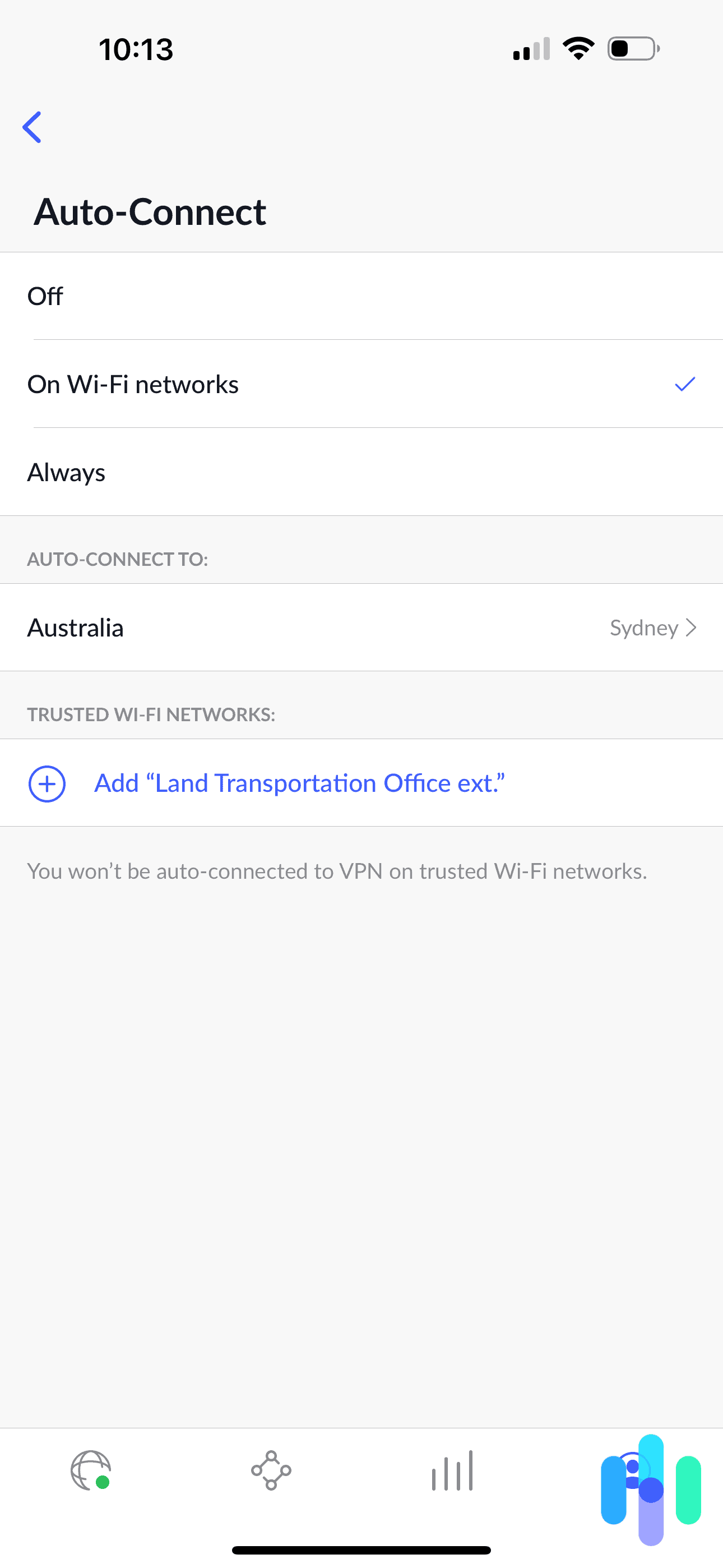
Should I Use A VPN on Mobile Data?
On that note, we always say that it’s recommended to use a VPN whenever connecting to a public Wi-Fi network. That’s because public networks tend to be insecure, and anyone on the same network as you can use malware or hacking techniques to peek behind the curtain and spy on your online activity.
How about when using mobile data? Unless you’re using your iPhone as a hotspot, no one else is on the same local network as you. That makes mobile data safer than a public network.
On the other hand, that doesn’t make you any safer from bad actors on the internet, such as those trying to scrape IP addresses for marketing or malicious services trying to steal sensitive information from you. That’s why, if your bandwidth and carrier’s data allowance permits, we recommend turning on your VPN.
» Read more: Do VPNs Hide My Browsing History?
Final Thoughts: Other Ways To Improve iPhone Cybersecurity
Using a VPN, unfortunately, is just one piece of the cybersecurity puzzle. It protects your privacy and online data, but there are other types of threats to worry about. For example, even though iPhones and iPads don’t get malware, they can become hosts to malicious software from the internet and infect your other devices. That’s why we still recommend using antivirus software on iPhones.
>> Related Article: The Best Password Managers for iPhone
Thankfully, Apple takes really good care of its reputation in cybersecurity, and it’s constantly coming up with ways to help iPhone users improve their digital health. One is the iCloud + Private Relay, which is a good way to hide your personal information and location when using Safari.
Take note of such features, and if possible, use them along with your existing digital security measures to improve your overall digital health.
FAQs About iPhone VPNs
-
Do I need a VPN on my iPhone?
Yes, you need a VPN on your iPhone while you’re on public Wi-Fi networks. A VPN on a mobile device acts just as it does with a desktop or laptop: it creates an encrypted, private tunnel between our iPhones and public Wi-Fi networks. This gives us the ability to browse the Internet securely and privately than if we were to just connect directly to a public network.
-
How do I get a VPN on my iPhone?
To get a VPN on your iPhone, you simply have to go to the app store, search for whatever VPN you decided on, and download the application onto your phone. Once you’ve downloaded and opened the app, you will be prompted to select a payment plan. Most VPNs have at least a few options in terms of pricing and contract length in order to fit everyone’s needs and budget. Once you pick a subscription, enter your payment information and click purchase, just sign in with your username and password on the iOS app.
-
Will I be tracked with a VPN?
Typically, we aren’t tracked if we are using a VPN. VPNs hide our web traffic and many also replace our real IP address with a standin. Some even take additional steps to rotate the new IP address. However, there are some companies that would keep our real IP addresses and device types as well as when we connected the VPN. Information like that can be used to track us, and that’s why it’s important to look closely at a VPN’s privacy policy.
-
Do I have to pay for a VPN?
Most top VPNs require a paid subscription, but there are some good free VPN services too. For example, Proton VPN’s free version provides unlimited data, strong privacy, and fast speeds.
-
Is my information safe with a VPN?
It depends on the VPN, but generally speaking, yes, your information is safe with a VPN, although some are more trustworthy than others. We always look for VPNs with no-log data policies that have been third-party audited. That means they don’t store any of our information, and a separate company looks through their data and processes to ensure the data policy is followed. Then, military-grade encryption, a kill switch, and leak protection keep browsing and data input to sites or apps private.
-
SSLTrust. (2022, Jan 1). What and how strong is 256-bit Encryption?
ssltrust.com/blog/what-is-256-bit-encryption


